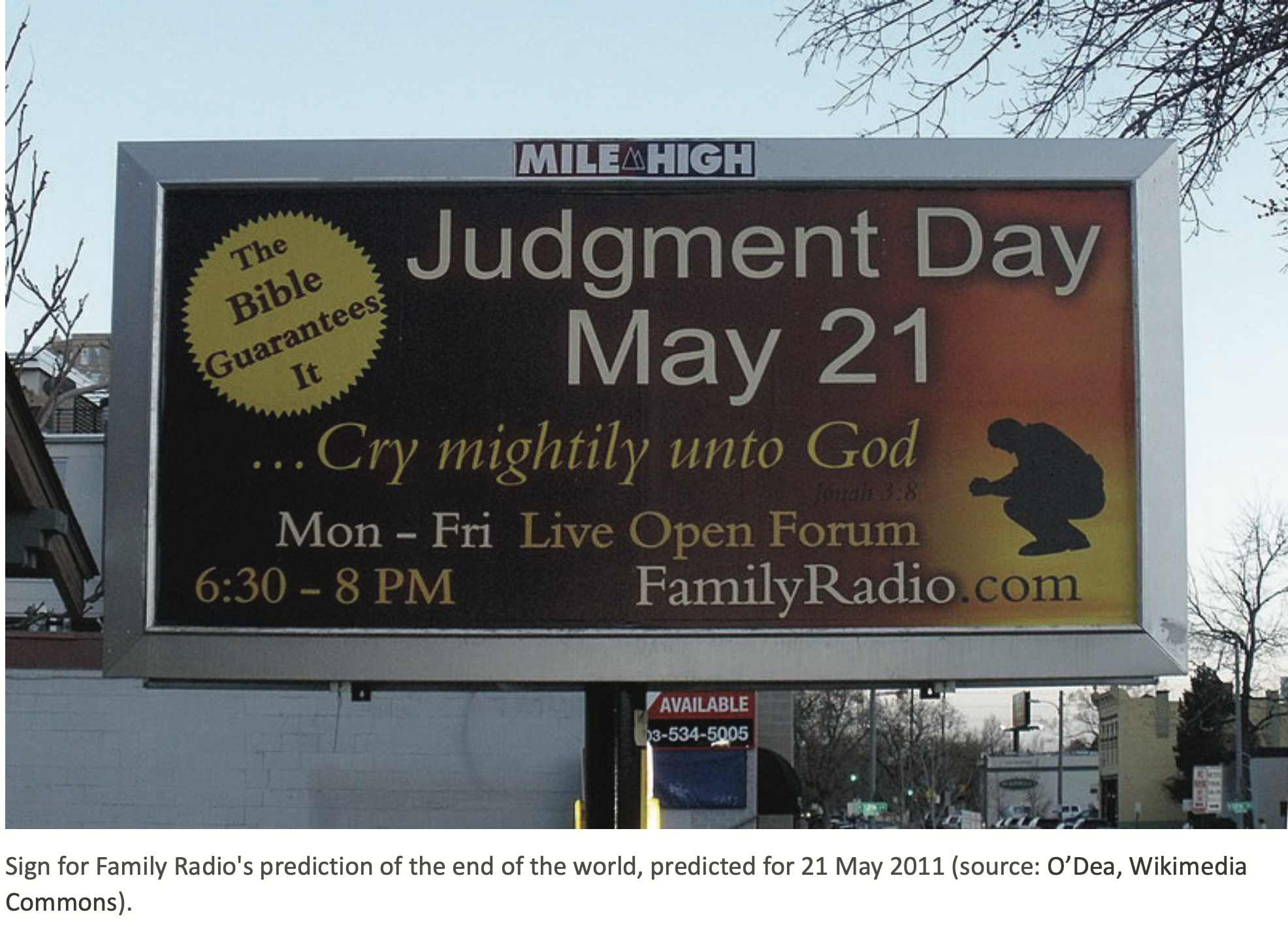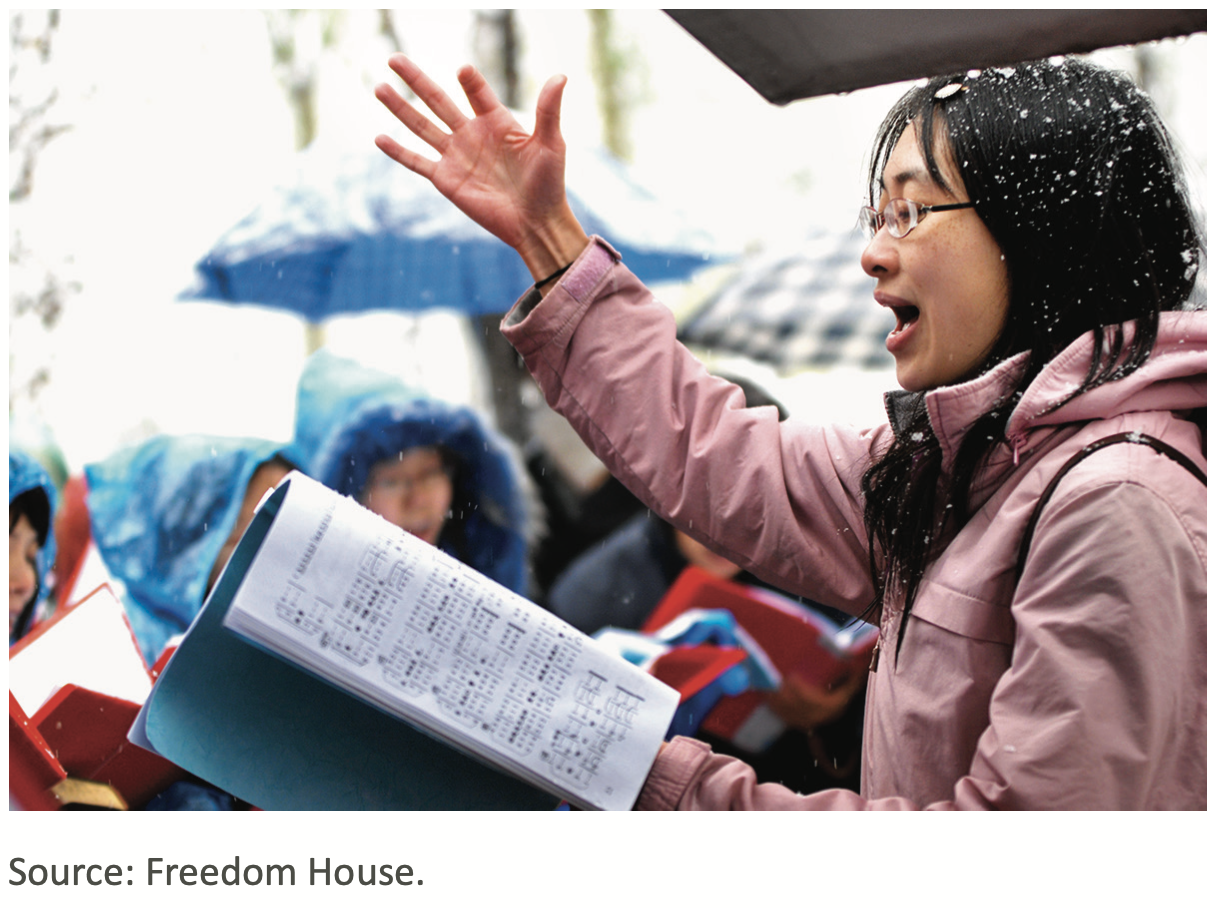
1) The prediction of Christ’s return in 2011, known as the May 2nd movement, gained considerable traction among evangelicals, although now it only exists as a remnant of end-times believers. Harold Camping, a Bible teacher and president of the evangelical Family Radio Network, initially made his prediction of Christ’s return for 1994 based on an arcane interpretation of scripture, but then recalibrated it to 2011. Camping also taught that the end of the “church era” was in 1988 and called on Christians to withdraw from their congregations. His message was promoted not only on Family Radio stations but also the Internet, a small network of Bible fellowships teaching his views, and caravans that displayed the 2011 message in cities around the world. Since Camping died in 2013, his message has been reaffirmed by followers, especially with the Alameida Bible Fellowship he founded in northern California still operating (for although Camping viewed the institutional church as defunct, his movement started “Bible fellowships” to expound on his end-of-times teachings).

In Camping’s absence, Family Radio has reverted to much of its evangelical origins, although it has been reduced to only a few stations and has experienced a serious loss of revenue from its high-water mark in 2011. Under its new owner, Tom Evans, the network no longer offers end-of-times predictions, and the teaching of the “end of the church” had been repudiated by 2018. The Alameida Fellowship and the online E-Bible Fellowship, led by Chris McCann, still have a strong prophetic thrust, either reaffirming Camping’s timetable—with some revisions—or, in the case of the later, making new predictions. Before he died, however, Camping, who admitted to failing to interpret the end-of-times and disavowed date-setting, disassociated himself from McCann’s prophetic ministry. (Source: paper presented by Charles Sarno at the Association for the Sociology of Religion conference, Zoom session, August 2021)
2) An Orthodox church-yurt for nomadic people has been consecrated by Russian Orthodox bishop Feofan (Kim) of Korea in Tuva, a Southern Siberian republic of the Russian Federation bordering Mongolia. This church is the second of its kind, as the archbishop had consecrated another one in 2020. The liturgy is celebrated in Church Slavonic, with some songs in the local language. Despite urbanization, a large number of people in these areas are still living in mobile tents. With only 10 parishes, the Russian Orthodox population is a small minority in this republic where Tibetan Buddhism and local shamanism dominate. This is not the only instance of Russian Orthodox clergy adopting unusual ways for ministering to people and ensuring liturgical life in faraway places, as illustrated by the existence of chapel boats. In Siberia, since 1996, Orthodox priests have been sailing regularly on a missionary boat church for reaching remote areas. A self-propelled boat church built in 2004 has been active on the Volga River. Yurt churches have also been launched by evangelical missionaries ministering to people of Mongolian descent. (Source: AsiaNews.it, August 30)

3) The politically and religiously heterodox Life Zen Temple has become the latest entry on China’s list of forbidden religions (xie jiao). Last spring, Public Security and agents of the unit specialized in combating xie jiao raided Life Zen Temple’s two communal settlements in Guizhou province, and officials proceeded to take members away to be “deprogrammed.” The case of Life Zen Temple follows a recent trend regarding the xie jiao: initially banned by decrees of local authorities at the provincial level, they are then denounced as xie jiao by the China Anf-Xie-Jiao Association and for all practical purposes become part of the national list of the xie jiao. Life Zen Temple has more than 2,000 members, most of them hidden in China, with their leader and founder Zhang Zifan, known to his followers as Xuefeng, safely living in Canada. Other Life Zen Temple groups exist in Thailand.

Beginning in 2009, Xuefeng had started founding communities in China, which were initially tolerated by the authorities, who found their references to communism and Chairman Mao reassuring. The group has been described as “a communist experiment” and a “utopian pastoral community” somewhat reminiscent of the Cultural Revolution, with members engaging in subsistence farming. While Xuefeng insists that the Life Zen Temple is not a religion and does not have rituals, believers are supposed to acknowledge that the founder is a divine incarnation who will lead them into the Millennium. The Temple believes that a 30-year period of tribulations started in 2018 and that in the subsequent Millennium a perfect “classless society” as prophesied by Marx, Lenin, and Chairman Mao will be realized. The Temple’s communism includes a spiritual element that points the way to immortality in the Millennium and to “Buddhahood” and enlightenment on Earth. It also criticizes the CCP for “having put Mao’s thought on the shelves” and revived elements of capitalism. Another feature of “Xuefeng-style communism” is the elimination of the bourgeois family, replaced by free love and the communal education of children. (Source: Bitter Winter, August 2)